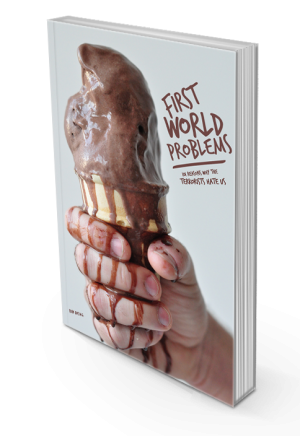This is what happens when instead of letting thoughts float out of your head, you type them into your phone:
Last week while I was walking my dog on one of the trails by our house, I noticed two kids walking over to pet my dog. As they approached, my dog took a break from sniffing a tree to doing his business. He finished pooping just as they arrived. I looked at them. They looked at me. I had to decide whether I wanted them to pet the dog and then I’d pick up the poop or if I’d pick up the poop first. Not wanting to risk them thinking I was going to just leave the poop, I gave a, “just a second” gesture and picked up the droppings. When weighing the decision of whether or not to buy a dog, you never really factor in how many people will watch you pick up poop in public. It’s a lot, in case you’re wondering.

(post poop)
A few weeks ago, while doing my weekly grocery shopping, the clerk asked if I’d like my peanut butter M&M’s separate from the rest of the groceries. This has happened a few times to me. Whether it’s gum, coke, or candy, the cashier will ask if I’d like it separate. Somewhere in training, I imagine a conversation taking place where they were instructed to offer the impulse items impulsively. I get the feeling he thinks I’d rip the bag out of his hands and start guzzling them if he didn’t politely ask. It’s not a reflection on the cashiers that they ask, more likely on society.
Income is largely a terrible way to measure quality of life. It can make a difference, but there are better means. Who has a higher quality of life: the man who makes $10,000 less but cooks every meal or the man who makes $10,000 more and eats most meals at a gas station? Counting the number of meals that were from a gas station in a given week is a pretty good indication of quality of life. I would bet money the happiest person in the world does not know what a Chuckwagon is.
How to think like an economist: With any solution I think of or that someone proposes, I ask myself, “Compared to what?” Too often the best solution isn’t chosen because people compare it to the perfect solution, which doesn’t exist, instead of the current situation.
Holding the door open for people is an art. If you make the decision to hold the door open when the person is too far away, it becomes awkward and you’re tempted into letting go of the door as they get close enough, which generally means the person has to catch a falling door, which is more work than opening a static door.
With outdoor seating at restaurants, every time a fly lands on me or my food, I sympthize with cows a little bit more.
I’ve never met someone who has adopted a highway.
Assorted fish is the scariest thing on menus at Asian or seafood restaurants. With fish, you always want specificity. Lutefisk could be included in assorted fish.
Some books written 2 years ago are already dated, while others written 200 years ago could have been written yesterday. The one constant is the human condition. Technology changes, people don’t.
While on hold with an insurance company today, lite jazz was blaring through the phone. Since I’ve been alive, on hold music hasn’t changed. I’d much rather hear a comedian or random 3 minute TED Talk than lite jazz at 16kps.
Incentives trump intentions. I was reminded of that when I heard about doctors in China who you pay when you’re healthy and they pay you when you’re sick. Many attempts to ban things unintentionally promote it.
The most desired person in the world is a cartographer. People crave a map and path to follow.
